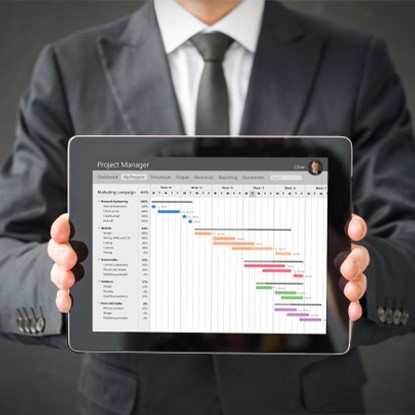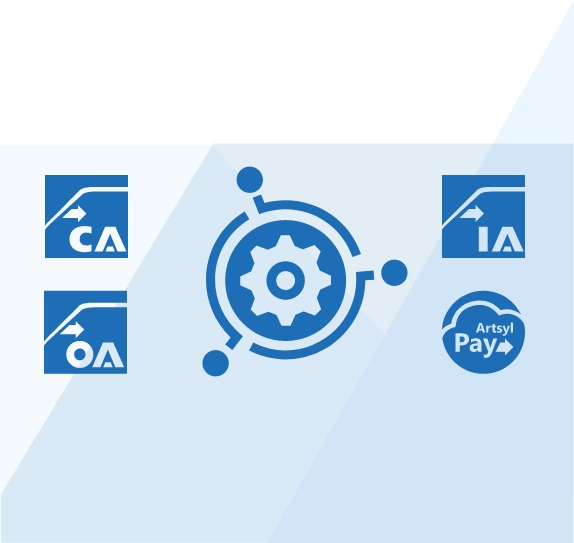Keeping track of business expenses is a necessary task that many professionals dread. The process can be laborious, time-consuming and even cost prohibitive if it is not managed strategically.
One of the best ways to simplify the expense management process is by using software. In this post, we’ll delve deeper into expense management software and why every money manager, expense & budget controller will thank you for it.
Drowning in piles of paper invoices? Step into the future with our state-of-the-art Invoice Action solution. Not only will your expense manager breeze through expense reports, but you can also revolutionize the way you handle every invoice.
Book a demo now
Managing Business Expenses
Managing business expenses is a critical aspect of ensuring a company’s financial health and sustainability. This involves tracking, categorizing, and analyzing all costs incurred in the course of business operations.
By efficiently managing business expenses, companies can maintain profitability, identify areas for cost savings, and ensure adequate cash flow. What’s more, diligently managing business expenses aids in budget forecasting, prevents fraudulent activities, and ensures compliance with financial regulations and tax laws.
How to Manage Revenue and Expenses?
Managing revenue and expense is fundamental to the financial stability and growth of any enterprise. On one hand, revenue management entails optimizing incoming funds, diversifying income streams, and ensuring consistent cash flow. On the other, expense management focuses on monitoring, categorizing, and controlling outgoing funds to ensure efficiency and prevent overspending.
Balancing the two requires a strategic approach: maximizing profit margins while investing wisely in growth opportunities. Regular financial analysis, forecasting, and the adoption of appropriate management tools are key to effectively navigating this balance and ensuring long-term financial health.
How to manage unbudgeted expenses
Managing unbudgeted expenses requires foresight, flexibility, and swift decision-making. Such unexpected costs can arise due to unforeseen events or overlooked items. To navigate them, it’s crucial to maintain an emergency fund or contingency reserve as part of your financial plan. This provides a cushion against sudden expenditures without derailing your budget.
When faced with an unbudgeted expense, evaluate its immediacy and necessity. If it’s avoidable, consider postponing or seeking alternative solutions. If it’s unavoidable, adjust other discretionary spending areas or reallocate funds to cover the cost.
Finally, review and adjust your budgeting process regularly to account for potential overlooked expenses in the future.
Why is it easier to manage a fixed expense?
Managing a fixed expense is inherently easier because its amount remains consistent over time. Unlike variable expenses that can fluctuate based on usage or external factors, fixed expenses—like rent or a monthly subscription—stay constant, allowing for predictable financial planning.
This consistency means there are no surprises when budgeting, making it simpler to allocate funds and ensure that sufficient money is set aside to cover these costs. Furthermore, with a known fixed amount, it’s straightforward to track and verify that payments are made as expected, reducing the complexity of financial oversight.
Overall, with multitude of expense types facing a business, In today’s competitive market, leveraging tools like expense management software can provide businesses with the edge they need to operate efficiently and strategically.
Intelligent Process Automation Solution
Related Videos
Why Is Expense Management Important?
Expense management process is crucial for businesses and organizations of all sizes for a number of reasons:
Financial Accuracy and Control
Proper expense management process ensures that financial records are accurate. This is essential for accurate financial reporting and for making informed business decisions based on those reports.
Cash Flow Management
By regularly monitoring and managing expenses, businesses can keep a close eye on their cash flow, ensuring they have sufficient funds to cover their operational costs and make necessary investments.
Budget Adherence
Expense management process ensures that expenses align with the budgeted amounts. Overspending can jeopardize a company’s financial health, while underspending might indicate missed opportunities.
Fraud Prevention
With proper oversight of expenses, business expense manager can detect and deter fraudulent activities. Employees are less likely to submit fraudulent expense claims if they know their expenses are being closely monitored and audited.
Compliance
Many industries have specific regulations related to financial reporting. Proper expense management tools ensure that businesses comply with these regulations, thereby avoiding penalties and potential legal complications.
Operational Efficiency
Automated expense management tools reduce manual processes and paperwork. This can lead to faster reimbursement processes and reduced administrative overhead, both of which improve operational efficiency.
Cost Savings
By closely monitoring and analyzing expenses, businesses can identify patterns or areas where they might be overspending and find opportunities to negotiate better terms with vendors or reduce costs.
Employee Satisfaction
A streamlined expense management process makes it easier for employees to submit and get reimbursed for legitimate business expenses. This enhances their overall job satisfaction and reduces frustration.
Strategic Decision Making
Analyzing expenses can provide insights into areas like travel, procurement, and operational costs. This data can be invaluable when making strategic decisions about company operations, vendor relationships, and more.
Tax Implications
Proper expense tracking ensures that businesses can claim all the allowable deductions during tax filing, potentially saving them significant amounts.
Transparency and Accountability
Good expense management practices bring transparency to organizational spending and hold departments and individuals accountable for their expenditures.
Given the direct impact on the bottom line, profitability, and operational efficiency, expense management is a fundamental aspect of financial and operational oversight in any organization.
Are late payments, lost sales orders, or manual data entries causing you headaches? It’s time for a change. Discover the power of integrated OrderAction order management solution. With us, every order is more than just a piece of paper—it’s an opportunity for accuracy,
clarity, and swift processing.
Book a demo now
How to Use Expense Management Software?
Expense management tools refer to a computer program or system used by businesses and individuals to process, pay, and audit employee-initiated expenses. These can include, but aren’t limited to, expenses incurred for travel, entertainment, and office supplies, as well as technology expense management and corporate credit card expense management.
The main objective of expense management software is to streamline and automate the expense reporting, approval, and reimbursement process.
Here are some features and benefits of expense management solution:
- Expense Reporting: Allows users to submit, monitor, and track their expense reports.
- Receipt Capture: Users can usually scan or take a photo of their receipts, which the software can then process and link to specific expenses.
- Policy Compliance: Companies can define expense policies within the software, making it easier to ensure that employee-submitted expenses adhere to company guidelines.
- Approval Workflow: Automated workflows enable supervisors or finance teams to approve or reject expenses.
- Integration: Many systems can integrate with accounting or ERP software, eliminating the need for manual data entry and reducing errors.
- Analytical Tools: Provides insights into spending patterns, which can help in budget planning and monitoring.
- Mobile Access: Many modern solutions offer mobile apps, allowing users to submit and approve expenses on the go.
- Reimbursement: Speeds up the reimbursement process for employees, improving employee satisfaction.
- Currency and Tax Handling: For businesses that operate internationally, the software can manage different currencies and handle tax implications.
- Fraud Detection: Advanced expense management solution might incorporate features to detect fraudulent or out-of-policy expenses.
By adopting an expense management solution, companies can increase efficiency, ensure compliance, reduce errors, and gain visibility into their expenditure, even without budgeting and expense management experience. There are various software solutions available in the market, ranging from those suited for small businesses to ones tailored for large multinational corporations.
Tired of disjointed financial systems? Meet ArtsylPay—our game-changing electronic payment platform that can be integrated with any expense management software. Seamlessly integrated, ArtsylPay promises not just simplified transactions but a whole new realm of efficiency and precision.
Book a demo now
The Value of Expense Management Software
Manual expense tracking can take hours on end and becomes especially tedious and time-consuming for larger companies. Expense management software automates this process and streamlines it for the convenience of the user. By minimizing the manual data entry required, employees will save time, and companies will see a reduction in labor costs as well.
Improved Accuracy
Expense management software eliminates the risk of human error that can occur when individual employees enter data manually. Digitizing expense reports not only reduces the risk of inaccuracies but also helps in keeping records that are updated regularly and are of high quality. This will result in fewer mistakes, quicker approvals and improved financial data quality.
Improved Compliance
Most expense management software includes compliance factors for regulatory requirements like country-specific tax regulations or local laws. This ensures that expense reports are compliant with the laws of the country or region. When it comes to regulatory compliance, it’s best to have software that is equipped to handle the task, as this can alleviate some of the related stress and risks.
Access to Useful Data
Expense management software makes it easier to access data based on various parameters such as department, accounts, or timeframes. This data can then be used to spot trends, optimize budgets and discern key cost drivers. Whether you are managing a small business or a large enterprise, the data insights provided by expense management software give you a competitive edge and help you make informed decisions about spending.
Better Tracking and Monitoring
Expense management software gives companies clear visibility into when and how much has been spent on various accounting tasks by different employees. In case of any fraudulent activity or misuse of the company’s expenses, management can identify and address the issue right away. Plus, access to real-time data provides CFOs the necessary tools to manage expenses better and make impactful business decisions.
As you can see, expense management software offers various benefits that reduce the workload and help companies optimize spending. With the improved visibility over spending, compliance with regulations and data insights at your fingertips, using expense management software is a no-brainer.
Investing in such software helps reduce the time required, ensure accuracy and ensures effective monitoring of expenses, giving you a competitive edge. There is no reason not to have expense management software as part of your organization’s arsenal of tools.

Tired of paper invoices?
From swift digital captures to intelligent categorizations, and even instant approval workflows, InvoiceAction is designed to save you time, reduce errors, and maximize your financial efficiency. Say goodbye to manual entries and hello to a smarter, streamlined financial future.
Expense Management Software As Part of Accounts Payable Automation
Expense management software and accounts payable (AP) automation are two components that, when integrated, can provide a comprehensive solution to streamline financial processes within an organization. While both have unique functionalities, when used together, they can significantly improve the efficiency, accuracy, and oversight of financial operations.
Here’s how expense management software can fit into the broader scope of accounts payable automation.
Unified AP Automation Platform
Integrating expense management software with AP automation means all financial transactions, whether they’re employee expenses or vendor payments, can be processed, approved, and tracked within a single platform. This reduces the likelihood of errors and provides a unified view of the company’s financial obligations.
Faster Payment Processing
AP automation can speed up the processing of invoices and payments. When you combine this with the rapid approval and reimbursement features of expense management software, it can lead to quicker settlements and happier employees and vendors.
Enhanced Approval Workflows
Both employee expenses and vendor payments typically require approvals. By integrating both systems, companies can implement consistent approval workflows across the board, ensuring all expenditures are reviewed and approved by the right stakeholders.
Better Cash Flow Management
With visibility into both employee expenses and accounts payable, finance teams can forecast and manage cash flow more effectively, ensuring there are always sufficient funds to cover both types of expenditure.
Compliance and Auditing
Integrating expense management with AP automation allows for robust compliance checks. This can be vital for adhering to internal policies, regulatory requirements, and ensuring the legitimacy of all transactions. Additionally, it makes auditing processes more streamlined and transparent.
Analytics and Reporting
A combined system can provide comprehensive analytics, giving insights into overall company spending, vendor relationships, employee expense trends, and potential cost-saving opportunities.
Reduced Paperwork
AP automation often involves digitizing invoices and integrating with digital payment systems. When combined with the digital receipt capturing of expense management software, it can lead to a significant reduction in paperwork and manual data entry.
Fraud Detection
Advanced AP and expense management systems may incorporate AI or machine learning for fraud detection. By analyzing patterns and flagging anomalies, such integrated systems can quickly identify and prevent fraudulent activities.
Integration with Other Financial Systems
A holistic solution that includes both expense management and AP automation can seamlessly integrate with other financial systems like ERP or accounting software, creating a comprehensive financial tech ecosystem.
Vendor Management
AP automation typically includes features for managing vendor details, payment terms, and histories. When aligned with expense management, it’s easier to differentiate between vendor payments and employee reimbursements.
Incorporating expense management software into an AP automation framework provides a holistic approach to managing company expenditures, improving transparency, efficiency, and financial control.
Dive into an experience where every expense is tracked, every invoice is managed, and every payment is just a click away. With ArtsylPay electronic payment processing platform at your fingertips, get ready to redefine your financial strategies and drive unparalleled results. Activate ArtsylPay today and witness financial management like never before!
Book a demo now
Final Words: Why Expense Management Software is So Helpful to Businesses
Expense management software is a digital tool used by businesses to streamline the processing, payment, and auditing of employee-initiated expenses, such as travel, entertainment, and supplies. It aids in ensuring accurate financial records, promotes policy compliance, and automates workflows for faster approvals and reimbursements.
Expense management software features often include receipt capture, integration with accounting systems, analytical tools, mobile access, and fraud detection. By adopting such software, companies can increase financial accuracy, enhance operational efficiency, reduce fraudulent activities, and gain insights into spending patterns.
FAQ
What is expense management software?
Expense management software is a tool designed for businesses to process, track, and audit employee-initiated expenses, helping to streamline reporting, approvals, and reimbursements.
Why is expense management software important?
It ensures financial accuracy, aids in cash flow management, ensures budget adherence, prevents fraud, facilitates compliance, and improves operational efficiency, among other benefits.
Can the expense management software integrate with my accounting or ERP system?
Most modern expense management software solutions can integrate with popular accounting and ERP systems to provide seamless data transfer and reduce manual data entry.
How does the receipt capture feature work?
Most solutions allow users to scan or take photos of receipts using a mobile device. The software then processes and links these receipts to specific expense entries, sometimes extracting relevant information automatically.
Is the expense management software cloud-based?
While some expense management solutions are cloud-based, offering advantages in terms of accessibility and updates, others might be on-premises. You’ll need to check with individual providers.
Can I set spending policies and limits within the expense management software?
Yes, many systems allow businesses to define and enforce expense policies, helping to ensure that submitted expenses adhere to company guidelines.
How does expense management software help in preventing fraud?
Expense management software can flag out-of-policy expenses, set limits, and, in advanced systems, detect unusual spending patterns or anomalies that might suggest fraud.
Is there a mobile app available?
Most modern solutions offer mobile apps, enabling users to submit, monitor, and approve expenses on the go.
How does expense management software assist with tax and currency conversions?
Many solutions offer features to handle multiple currencies, auto-calculate taxes, and even assist in VAT/GST reclaim processes, especially useful for businesses operating internationally.
Can expense management software provide insights into my company’s spending habits?
Yes. Most software offers analytics and reporting tools that can provide insights into spending patterns, helping in budget planning and identifying cost-saving opportunities.
What is the difference between expense management software and accounts payable software?
While there’s some overlap, expense management software primarily focuses on managing employee-initiated expenses. In contrast, accounts payable software deals with broader financial processes, including invoicing and payments to vendors and service providers.
Is my data secure with cloud-based expense management software?
Most reputable software providers prioritize security, utilizing encryption, regular backups, and compliance with data protection regulations. However, always review a provider’s security policies before committing.
How to manage your expenses?
Managing your expenses involves a combination of meticulous tracking, thoughtful budgeting, and regular review. Begin by categorizing and recording all your expenditures, no matter how insignificant they may seem. This can be done manually or by using expense-tracking apps. Next, set a realistic budget, allocating funds based on your priorities and needs.
Regularly compare your actual spending against this budget to identify areas where you might be overspending. Additionally, it’s essential to set aside savings and anticipate unexpected costs. Periodically review and adjust your budget, taking into account changes in income or lifestyle. By remaining disciplined and proactive, you can maintain financial stability and avoid unwanted debts.




 Vendor Management Software: Understanding the Benefits
Vendor Management Software: Understanding the Benefits Expense Management, Vendor Management, and Cash Flow Management
Expense Management, Vendor Management, and Cash Flow Management Document Management and Data Extraction in the Digital Age: The Impact of OCR Technology
Document Management and Data Extraction in the Digital Age: The Impact of OCR Technology Project Management and Invoicing
Project Management and Invoicing Understanding the Differences and Roles of Controllers and CFOs
Understanding the Differences and Roles of Controllers and CFOs Intelligent Document Processing for Document Management System
Intelligent Document Processing for Document Management System
